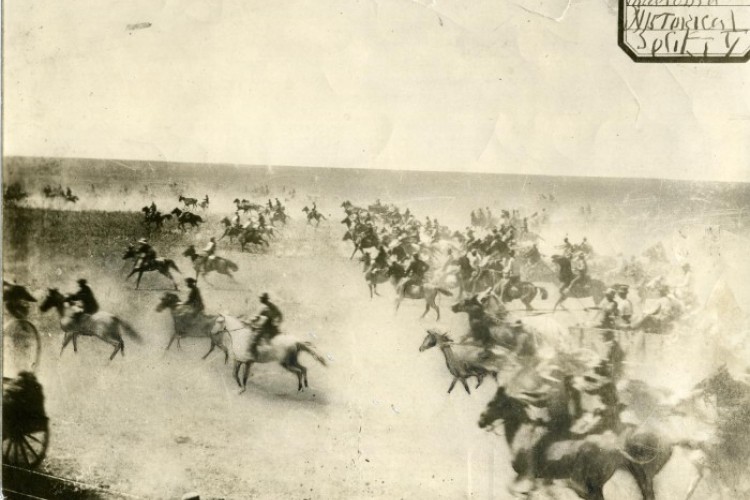Eliza Carpenter
Childhood in Enslavement
Eliza Carpenter was born into enslavement in Virginia in 1851. When she was six years old, she was sold and brought to Kentucky. At eight years old, she was resold and brought to Missouri.
Beginnings with Horses
After being emancipated after the Civil War, Carpenter returned to Kentucky and settled in Madisonville, located in Hopkins County.1
In Madisonville, Carpenter learned how to ride horses and began buying, training, selling, and racing them, particularly Thoroughbreds.2
She moved to Arkansas City, Kansas, where she continued buying horses, including Quarter Horses and Standardbreds
Racing
Carpenter began riding her own horses in races in Arkansas City. While she usually employed the jockey Olla “Lucky” Johnson, Carpenter sometimes rode the horses herself if she was dissatisfied with the day’s performance. Often, she rode simply if her favorite horse was running.4
Oklahoma Land Race
Land in Oklahoma that had first belonged to the Cherokee was opened to settlement in September of 1893.5 Known as the Cherokee Outlet Opening or the Cherokee Strip Land Run, this event allowed people to stake their claim to part of six million acres. Carpenter rode her chestnut mare down from Kansas in an attempt to be the first to reach what would become Ponca City. Though she was unsuccessful, she remained in the Ponca City area. She paid $1,000 for two lots in Broadboll Addition and established her stable there. From there, she raced her horses in Arkansas City, Winfield, Blackwell, Newkirk, Anthony, and Topeka, Kansas.6
Death and Legacy
While visiting family in Kentucky in 1924, Carpenter was thrown from a spooked horse. Though she returned to Ponca City, she never made a full recovery and passed away at age seventy-five. Carpenter was a pioneer in many ways. Her obituary notes her unique status as the only African American racehorse owner in Oklahoma, and one of the very few African American stable owners in the greater Western region.
Sources
“1895 Kansas Territory Census.” n.d. Microfilm reels K-1 to K-169. Kansas State Historical Society, Topeka, Kansas.
Afro-American. 1924. “Fans Mourn Woman Jockey,” December 20, 1924.
“Carpenter, Eliza.” n.d. In Notable Kentucky African Americans Database. University of Kentucky. Accessed February 17, 2020. https://nkaa.uky.edu/nkaa/items/show/2383.
“Cherokee Outlet Opening.” n.d. In The Encyclopedia of Oklahoma History and Culture. Oklahoma Historical Society. Accessed February 17, 2020. https://www.okhistory.org/publications/enc/entry.php?entry=CH021.
Collings, Ellsworth, Alma Miller England, and Glenn Shirley. 1971. The 101 Ranch. Norman; London: University of Oklahoma Press.
“State of Oklahoma Wills and Probate.” 1801. Probate case #5040A.
“Twelfth Federal Census, Oklahoma.” 1900. Index 23.
Citation
When citing this article as a source in Chicago Manual of Style use this format: Last name, first name of Author. Chronicle of African Americans in the Horse Industry. n.d. “Title of Profile or Story.” International Museum of the Horse. Accessed date. URL of page cited.





